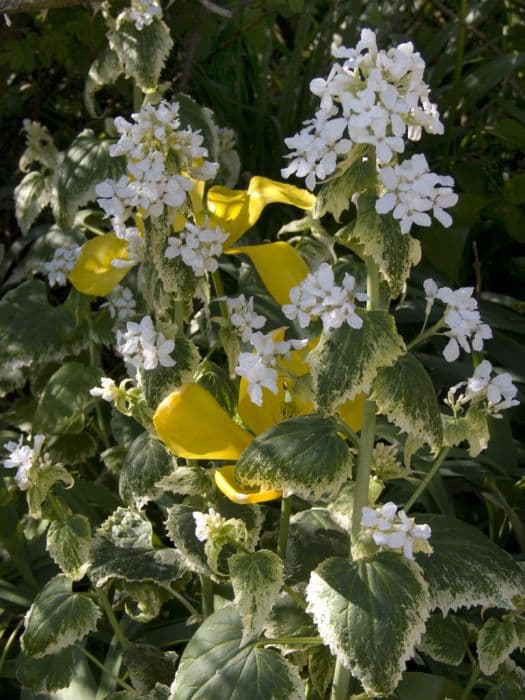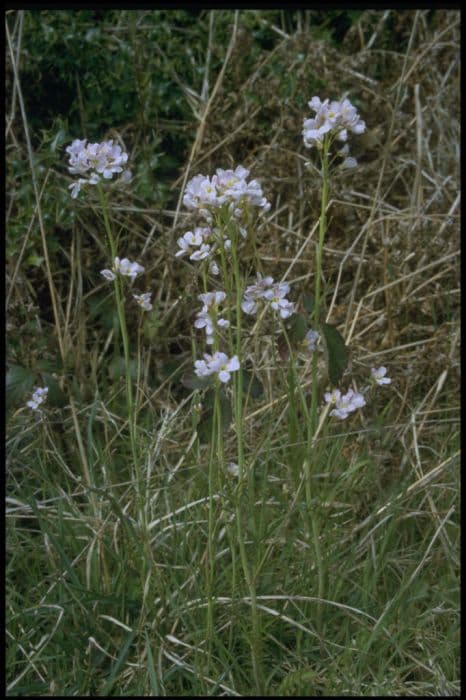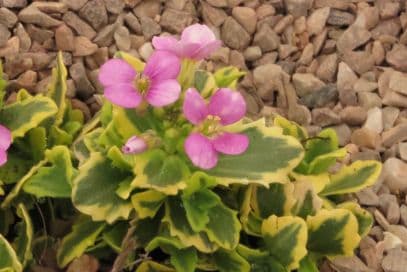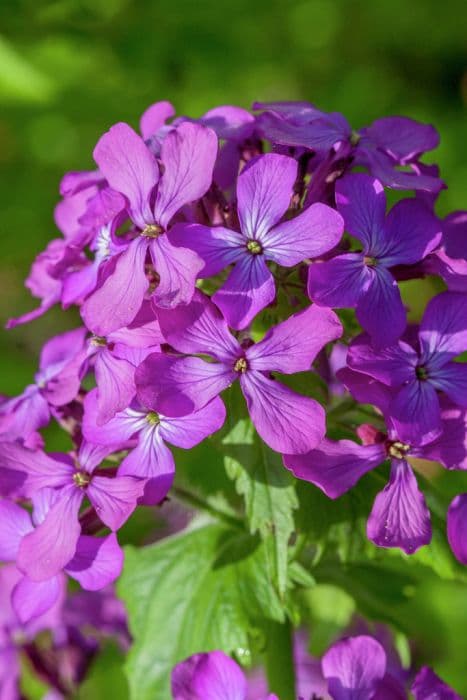Broccoli Brassica oleracea var. italica



ABOUT
Broccoli is a vegetable plant that typically grows to be about 2-3 feet tall. The central stalk of the plant produces multiple branches with large, green leaves, and the head of the plant, which is harvested for consumption, can grow to be around 6-8 inches in diameter.
About this plant
 Names
NamesFamily
Brassicaceae
Synonyms
Broccoli, Asparagus broccoli, Calabrese, Cape broccoli, Italian broccoli, Purple cauliflower, Sprouting broccoli
Common names
Brassica oleracea, Brassica oleracea Italica Group
 Toxicity
ToxicityTo humans
Broccoli is generally considered safe for human consumption and is widely recognized for its health benefits. However, consuming very high amounts of cruciferous vegetables like broccoli can interfere with thyroid function in some individuals due to their goitrogenic properties.
To pets
Broccoli is not toxic to most animals, but it can cause gastrointestinal problems in pets like dogs and cats if consumed in large amounts. Additionally, certain chemicals found in broccoli, such as isothiocyanates, can be toxic to some animals in high doses. It is always best to consult with a veterinarian before feeding broccoli or any other new food to pets.
 Characteristics
CharacteristicsLife cycle
Biennials
Foliage type
Evergreen
Color of leaves
Green
Flower color
Yellow
Height
Up to 3 feet
Spread
Up to 3 feet
Hardiness zones
1
Native area
Mediterranean
Benefits
 General Benefits
General BenefitsHigh in fiber: Broccoli is a good source of fiber which can aid in digestion and promote bowel regularity.
Low in calories: Broccoli is a low-calorie vegetable, making it a great choice for weight management.
Rich in vitamins and minerals: Broccoli is a good source of vitamins A, C, K, and B vitamins, as well as minerals such as calcium, magnesium, and potassium.
Antioxidant properties: Broccoli contains antioxidants that can help protect against oxidative stress and cell damage.
May have anti-inflammatory properties: Broccoli contains compounds that have anti-inflammatory properties and may help reduce inflammation in the body.
May have cancer-fighting properties: Some studies suggest that broccoli contains compounds that may help reduce the risk of certain types of cancer, such as breast, prostate, and colon cancer.
May improve heart health: Broccoli contains fiber, antioxidants, and other compounds that may help lower cholesterol levels and reduce the risk of heart disease. Medical Properties
Medical PropertiesAnti-inflammatory properties: Broccoli contains compounds with anti-inflammatory properties, which may help to reduce inflammation and related health conditions.
Digestive health: The fiber content of broccoli can help to promote digestive health and reduce the risk of constipation and other digestive issues.
Heart health: The fiber, potassium, and antioxidants in broccoli may help to lower blood pressure, reduce the risk of heart disease, and improve overall cardiovascular health.
Bone health: Broccoli is a good source of calcium, which is important for building and maintaining strong bones.
Immune system support: The high levels of vitamin C in broccoli can help to support the immune system and promote overall health.
Cancer prevention: Broccoli contains compounds that may help to prevent certain types of cancer, including breast, prostate, and colon cancer. Air-purifying Qualities
Air-purifying QualitiesBroccoli is not typically known for its air-purifying qualities.
Interesting Facts
 Feng Shui
Feng ShuiIn general, green vegetables like broccoli are believed to be associated with the Wood element in feng shui, which represents growth, vitality, and harmony.
 Zodiac Sign Compitability
Zodiac Sign CompitabilityBroccoli does not have a specific symbolic meaning in astrology
 Plant Symbolism
Plant SymbolismBroccoli has various symbolic meanings in different cultures. In some cultures, it is a symbol of fertility and abundance, while in others, it represents strength, endurance, and resilience. In the language of flowers, broccoli symbolizes unity and combining strengths. It can also be a symbol of health and wellness due to its nutritious properties.
 Water
WaterBroccoli is a cool-season crop that prefers consistent moisture but not waterlogged soil, so it is important to water deeply and regularly but avoid overwatering. The best way to determine when to water is to check the top inch of soil and water when it feels dry to the touch.
 Light
LightBroccoli requires full sun, which is defined as at least 6 hours of direct sunlight per day. However, it can also tolerate some shade.
 Temperature
TemperatureBroccoli can tolerate temperatures between 45-75°F (7-24°C), but its ideal temperature range is between 60-65°F (15.5-18.5°C). It can also survive temperatures as low as 20°F (-6.7°C) and as high as 85°F (29.4°C), although extreme temperatures can reduce growth and quality.
 Pruning
PruningBroccoli plants do not typically require pruning.
 Cleaning
CleaningNot needed
 Soil
SoilThe best soil for broccoli is a well-draining, fertile soil with a pH between 6.0 and 7.0. Broccoli plants should be fertilized with a balanced fertilizer before planting, and then again every 3-4 weeks throughout the growing season.
 Repotting
RepottingBroccoli is typically grown as an annual plant and does not need to be repotted during its growing season.
 Humidity & Misting
Humidity & MistingBroccoli prefers a moderate to high level of humidity, ideally between 40-60%. However, it can tolerate lower humidity levels as well. It is important to avoid overwatering or excessively humid conditions, as this can lead to fungal diseases.
 Suitable locations
Suitable locationsIndoor
Not growing.
Outdoor
Cultivated almost all over the world during the growing season
Hardiness zone
USDA 2 and higher
 Life cycle
Life cycleGermination and seedling stage: This stage lasts for about 3-4 weeks. Broccoli seeds are sown in seed trays or directly in the soil in early spring (around March or April depending on the location). They need warm and moist soil to germinate. Once the seedlings have grown 4-5 true leaves, they are ready to be transplanted.
Vegetative stage: This stage lasts for about 5-6 weeks. After transplanting, broccoli seedlings continue to grow and produce leaves. They need adequate sunlight, water, and nutrients to grow healthy.
Reproductive stage: This stage begins in late spring or early summer (around June or July depending on the location) and lasts for about 2-3 weeks. During this stage, broccoli plants produce buds that eventually turn into flowers. The flowers attract bees and other pollinators.
Harvesting stage: This stage starts in mid-summer (around July or August depending on the location) and can last up to 2 months. Broccoli heads should be harvested before they start to flower. The timing of the harvest depends on the variety of broccoli, but typically it is ready to be harvested when the head is dark green, compact, and firm. It is important to harvest the heads when they are ready to prevent them from turning bitter.
Regrowth stage: After harvesting the main head, the broccoli plant will continue to grow side shoots. These can be harvested continuously for several weeks until the plant becomes exhausted. Propogation
PropogationPropogation time
Early spring - fall
Broccoli can be propagated by either direct seeding or transplanting seedlings. The ideal time for planting broccoli seeds or seedlings will depend on the climate and the variety of broccoli being grown. In general, broccoli can be planted in the early spring or late summer/fall, depending on the location.
In areas with a mild climate, broccoli can be planted in late winter or early spring, as soon as the soil can be worked. In areas with a cold climate, broccoli should be planted in the spring, after the danger of frost has passed. In warmer regions, broccoli can also be planted in the fall for a late fall or winter harvest.
It is important to keep in mind that broccoli grows best in cooler weather and may bolt (go to seed) prematurely in hot weather. Therefore, it is important to choose the right time to plant based on the climate and variety of broccoli.
 Pests
PestsAphid, Slugs and snails
 Diseases
DiseasesStem rot, Downy mildew, Root Rot, Powdery mildew, Rust









